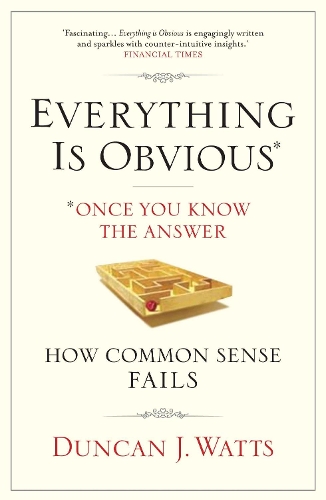
Everything is Obvious: Why Common Sense is Nonsense
(Paperback, Main)
Publishing Details
Everything is Obvious: Why Common Sense is Nonsense
By (Author) Duncan J. Watts
Atlantic Books
Atlantic Books
1st May 2012
1st March 2012
Main
United Kingdom
Classifications
Tertiary Education
Non Fiction
Popular psychology
153.4
Physical Properties
Paperback
352
Width 129mm, Height 198mm, Spine 25mm
303g
Description
Why is the Mona Lisa the most famous painting in the world Why did Facebook succeed when other social networking sites failed Did the surge in Iraq really lead to less violence And does higher pay incentivize people to work harder If you think the answers to these questions are a matter of common sense, think again. As sociologist and network science pioneer Duncan Watts explains in this provocative book, the explanations that we give for the outcomes that we observe in life-explanations that seem obvious once we know the answer-are less useful than they seem. Watts shows how commonsense reasoning and history conspire to mislead us into thinking that we understand more about the world of human behavior than we do; and in turn, why attempts to predict, manage, or manipulate social and economic systems so often go awry. Only by understanding how and when common sense fails can we improve how we plan for the future, as well as understand the present-an argument that has important implications in politics, business, marketing, and even everyday life.
Reviews
From the reviews of Everything is Obvious:
'A fascinating book that ranges through psychology, economics, marketing and the science of networks.' Wall Street Journal
'Watts is an enjoyable companion... His enthusiasm is admirable and the book will hold valuable insights for a great many professions.' Prospect
'Penetrating and engaging... Common sense is a kind of bespoke make-believe, and we can no more use it to scientifically explain the workings of the social world than we can use a hammer to understand molluscs... It's this sort of study, not common sense, that will shed bright light on human affairs.'
Author Bio
Duncan Watts is a principal research scientist at Yahoo! Research, and a former professor of sociology at Columbia University. His research on social networks and collective dynamics has appeared in a wide range of academic journals, including Nature, Science, and the American Journal of Sociology. He is also the author of two previous books, Six Degrees: The Science of a Connected Age; and Small Worlds: The Dynamics of Networks between Order and Randomness. An Australian, he lives in New York.
